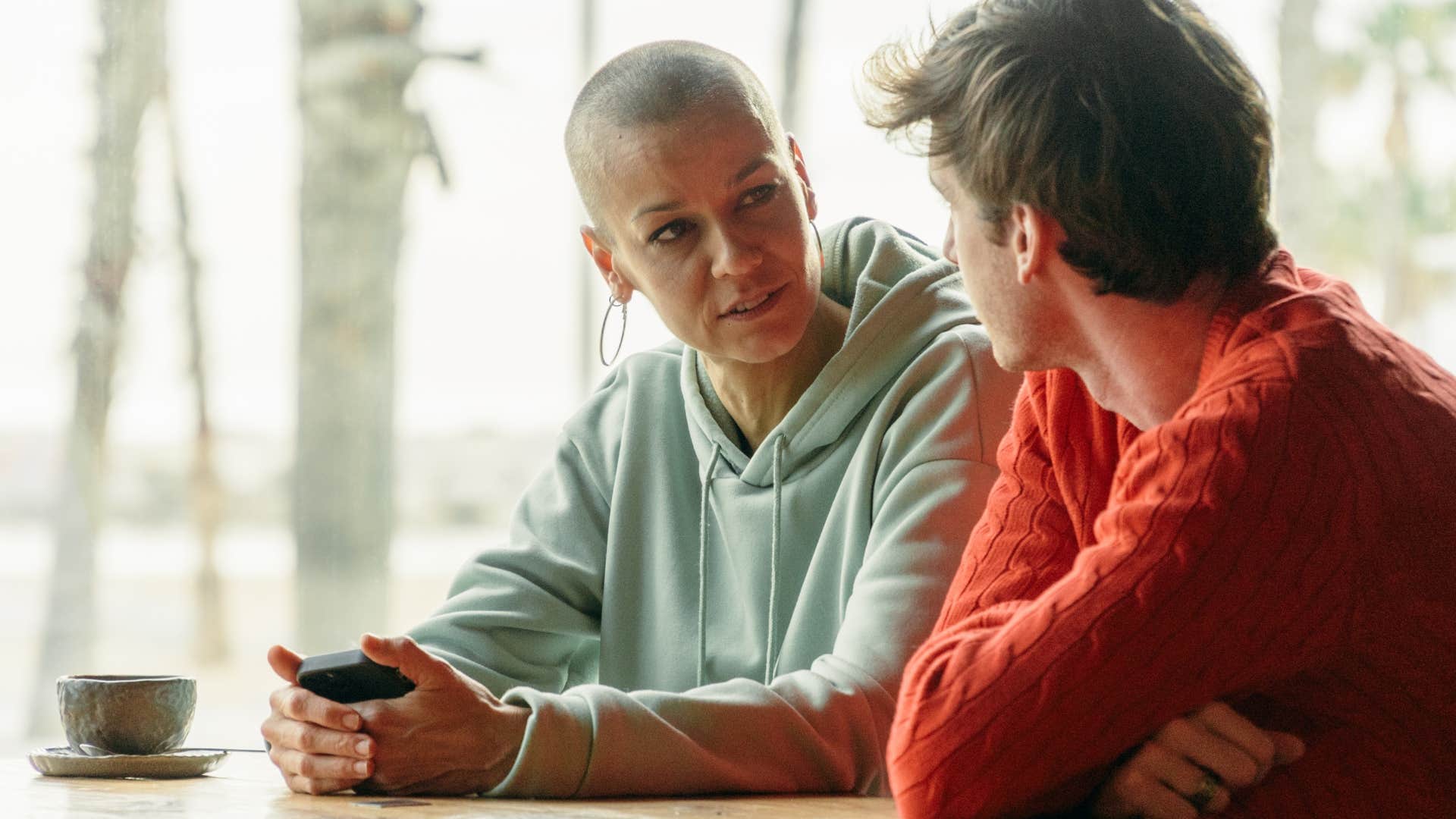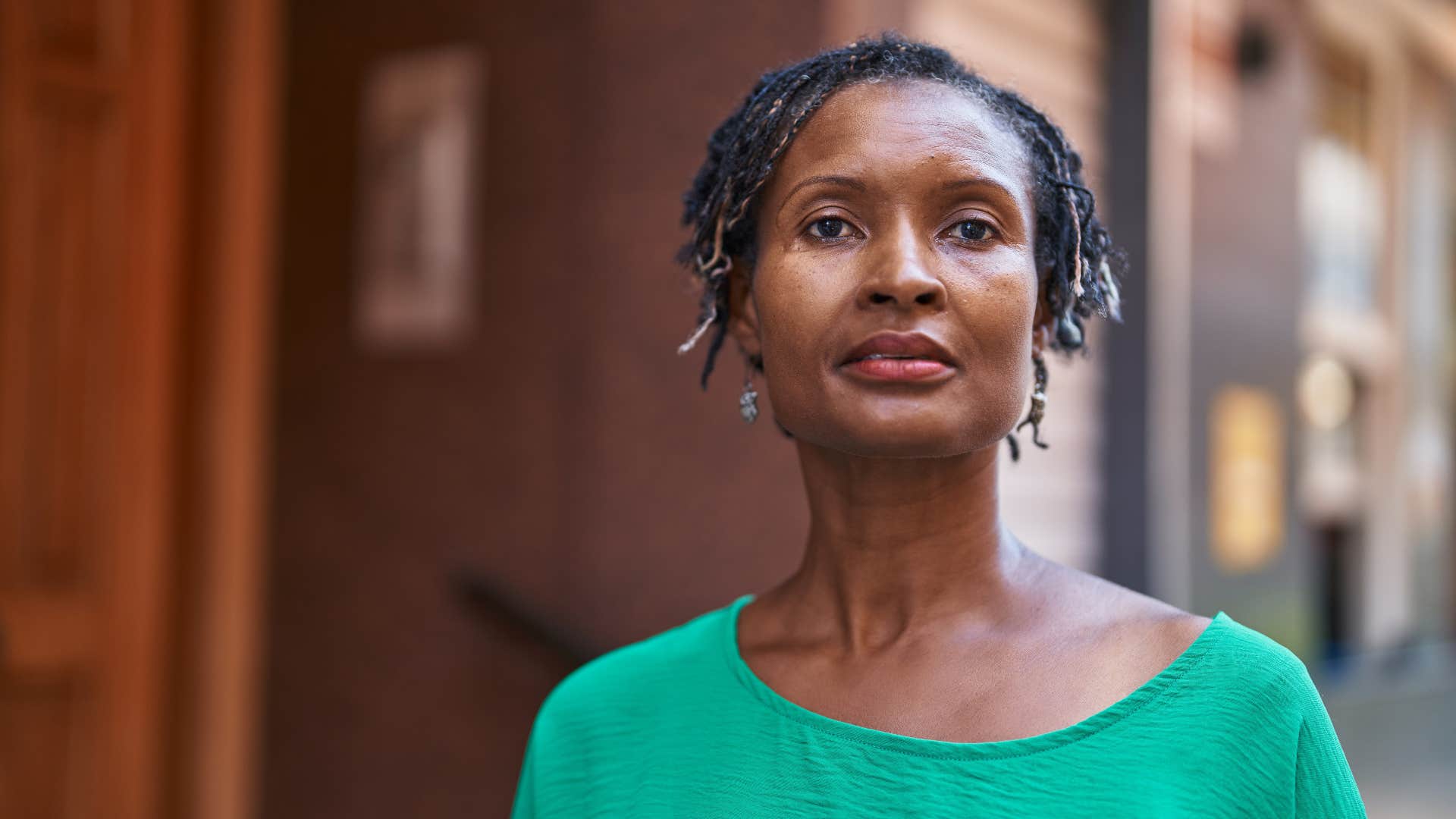If Someone’s Done Pretending To Like Everyone, They’ll Start Saying These 11 Honest Things
Once you start prioritizing your peace, you no longer choose to bite your tongue.
 MAYA LAB / Shutterstock
MAYA LAB / Shutterstock There comes a point when pretending can be exhausting, whether you're pretending to enjoy a hobby, a job, or even the area where you live. You start wanting to exist in honesty, and that also includes being nice to people who may not deserve your niceness. You might start getting tired of having to shrink yourself down, bite your tongue, or just let people cross lines that you normally wouldn't be fine with. At some point, you realize that it's not worth it, and that being likable shouldn't compromise the values that you look for in another person.
When someone is finally done pretending to like everyone and needing everyone else to like them as well, they start being a bit more honest about things. Once that flip finally switches, you notice that you're no longer forcing yourself into conversations that don't feel right or pretending to be cool with people who've shown you time and time again the type of person they are. Once you start prioritizing your own peace over appeasing other people and trying not to rock the boat, you notice that you begin to feel a bit freer. You're taking back control of your own life, and it feels good.
If someone's done pretending to like everyone, they'll start saying these 11 honest things:
1. 'I don't have the energy for small talk today'
 Mariana_erato | Shutterstock
Mariana_erato | Shutterstock
There are some days when you know you're mentally tapped out and just don't have the energy to carry on the simplest of conversations. It's not because you're trying to be antisocial, and on any other day, you'd be willing to carry the small and mundane talks with people. Rather than pretending just for the sake of it, you're giving yourself permission to exist without having to entertain or impress other people. You're recognizing that your social battery has its limits, and you refuse to compromise that for people that you may not even like or enjoy being around in the first place.
"Several factors contribute to social battery depletion, affecting an individual’s mind and overall experience in social situations. Environmental influences, group dynamics, and personal boundaries play crucial roles in energy drain," explained psychologist Dr. Brad Brenner.
The right people won't take it to heart when you tell them that you need space and quiet. They'll recognize it as you not trying to reject them but choosing to rest instead. They'll still be there when you're ready to open up again, too, and when you finally engage in conversation with them, it'll be much easier and more genuine.
2. 'That's not my crowd'
 fizkes | Shutterstock
fizkes | Shutterstock
Some people just won't be your cup of tea, and that's more than okay. Rather than trying to pretend that you fit in with them or enjoy their company, you're standing your ground and being honest. "That's not my crowd" comes from a place of no longer forcing yourself into spaces that just don't feel right and admitting that not every group is meant for you. Trying to fit in is quite exhausting anyway. For a long time, you might've been the type of person who'd show up, smile, and laugh at the "jokes' that you didn't even think were funny, and then at the end of the night when you left, you'd feel more depleted than when you showed up.
"Ask yourself who around you is draining you, sucking your energy and taking you hostage, making you feel insecure and less than, not supporting you and your story. What relationships in your life are lopsided? But more importantly, what are you going to do about it?" suggested licensed therapist John Kim.
Once that flip switches, you realize that the people who are meant to be in your life will leave your nervous system feeling calm and relaxed, not deregulated. It becomes increasingly freeing when you walk away from the wrong crowds without carrying that guilt. You should go when your energy feels the most respected and where you know that the connection doesn't seem forced at all.
3. 'I don't agree with that'
 Anatoliy Karlyuk | Shutterstock
Anatoliy Karlyuk | Shutterstock
The moment that you stop nodding along to keep the peace and finally start standing by what actually feels true to you is when you're no longer afraid of being real. By bravely saying that you don't necessarily agree with someone's opinion, joke, or subject matter is the moment when you've finally stopped pretending to like them just for the sake of it. You can still disagree with someone and be kind about it, but it's important to stand your ground when you hear something that doesn't align with your own morals and values.
According to research, people actually favor those who share their viewpoints and will evaluate individuals they like positively across various characteristics, including perceiving them as better listeners, being more agreeable, approachable, and even funnier than others.
There's also just a sense of relief of knowing that you spoke up, even when it might've felt uncomfortable or scary in the moment. The people who genuinely enjoy being around you and who match your energy will never be offended by your honesty, either. They'll actually end up respecting you more for it, rather than you just going along with the flow because of how much you've been pretending to like them.
4. 'I don't owe everyone my kindness'
 Romanchini | Shutterstock
Romanchini | Shutterstock
At some point, you start to realize that not everyone is deserving of your kindness. You might've spent a long time just being known as the "nice one." You were the type of person who smiled even when you were being disrespected or gave grace to people who would constantly abuse it. But eventually, you noticed a shift where you were giving people access to the soft side of your personality when they weren't even good people to begin with.
"What about when being genuinely kind? Why then do others not respect you and even try to take advantage of you? More often than not, it's more about them than you. They frequently are the ones with the weaknesses or deficiencies," pointed out digital health expert Bruce Y. Lee.
Being someone who starts extending your kindness more selectively means that you've learned not to be polite to people who wouldn't ever extend the same courtesy to you. Kindness is something that's earned through being respectful and trusting. It's giving it to people who show you they deserve it, not just because you've been pretending to like them. You are allowed to protect your energy, but it means first treating yourself with enough respect to know when someone deserves your effort versus someone who doesn't.
5. 'I'm not explaining myself again'
 PeopleImages | Shutterstock
PeopleImages | Shutterstock
You might've once felt the need to always justify yourself to other people. But, the truth is, people who want to understand you will without you needing to over-explain yourself, especially when it comes to the important things like your boundaries. You only really need to say something once, and if you've calmly articulated yourself, the people who still don't get it have a problem of their own that doesn't concern you.
"Over-explaining isn’t always just about trying to win approval—it can also come from the way your brain is wired or shaped by past experiences. People who people-please, feel anxious, or have experienced trauma might explain a lot to avoid conflict or rejection," explained licensed mental health counselor Stephanie Moulton Sarkis.
Once you realize that you're done explaining yourself, you notice that there's such a freedom in not having to break things down for every single person you come across. You don't need their approval, nor do you need to be understood by people who just aren't listening in the first place. You shouldn't need to spell things out for people to respect you, either. And once you stop pretending that certain people are meant to be in your life, you can make room for those who genuinely care about the things you're saying.
6. 'I'm not going out of my way anymore'
 Chay_Tee | Shutterstock
Chay_Tee | Shutterstock
There really does come a time when you're done bending over backward for others, especially when it just leaves you feeling empty. You might've spent so much of your life going out of your way for other people, whether it's doing favors for them when asked or rearranging your schedule completely just to accommodate their needs. But not anymore. Once you stop pretending to like everyone, you start to notice that you have zero energy to abandon the things that matter to you just to appease them.
Now, you have no problems setting boundaries. You give what feels fair to those who give you the same in return. You're no longer holding on to this expectation that everyone will just appreciate the things you're doing for them because the reality is that they don't always. It's simply about learning where your presence matters most and who cherishes it just as much as you do.
7. 'I don't chase approval'
 insta_photos | Shutterstock
insta_photos | Shutterstock
In the same way that you've finally set boundaries with people when it comes to extending your kindness and giving your time to them, you feel the same way about their approval, too. You're no longer spending sleepless nights trying to be liked. You're starting to learn that your self-worth depends on how you feel about yourself and putting energy into those who will respect your authentic personality, no matter what.
Now, you make decisions and act on how you feel because that's what you want to do. You're no longer basing it on how other people will react. You're not overthinking the things you're saying or worrying about being judged for making a specific choice that fits within your life. You're no longer waiting around for the approval just so you can feel validated.
8. 'I'm not acting okay when I'm not'
 fizkes | Shutterstock
fizkes | Shutterstock
There might've been a long period of your life where your automatic response to being asked about your well-being was just to politely nod, smile, and say that you're doing well, even when you weren't. Finally being able to stop faking it and actually admitting how you're doing is finally being okay with pretending that not everything is perfect. You might've thought it was a weakness of sorts to be vulnerable, especially when you were walking around pretending to like everyone.
You were just the type of person who suffered quietly. But over time, that mask of perfection became heavy and exhausting. Once you finally come to terms with letting it slip and drop completely, the people who are meant to be in your life will see you for who you are and embrace every part of you without question. You'll finally feel free. And the people who can't handle it will file out of your life in the way that they were meant to. And there's some relief and freedom in that, too.
9. 'I'm not sugarcoating how I feel'
 Zamrznuti tonovi | Shutterstock
Zamrznuti tonovi | Shutterstock
You might've been the type of person who filtered and softened your words just to prevent any sort of conflict or keep relationships intact, even when that relationship wasn't fulfilling to you anymore. You'd be the first to apologize to keep the peace. But when you bottle up your feelings like that, you'd be surprised at the fact that you're not keeping the peace at all, but actually just making conflicts worse. Brushing things under the rug doesn't make them disappear.
You actually end up getting a really lumpy carpet that'll eventually start spilling over. Being able to communicate honestly will save you a lot of time and effort down the line. Once you realize that, you start noticing how much easier it is to say what you mean, and mean what you say. If something is bothering you, you'll share it and allow people to hear what you're saying.
10. 'I don't owe them a smile'
 Krakenimages.com | Shutterstock
Krakenimages.com | Shutterstock
Just as not everyone deserves your kindness, not everyone is owed a smile from you either. Spending so long just forcing smiles at people who are actually draining your energy just because you're pretending to like them isn't a good thing. A smile is technically a gift, and you are the only person who gets to choose who's receiving it.
By reserving your smiles for people who are actually genuine, you're practicing self-respect. The people who truly care about you won't be offended by the lack of a smile. They'll understand that it's not personal at all, either. For the people who are offended? Well, that's their problem at the end of the day. You're not responsible for making other people feel comfortable at the expense of your own happiness.
11. 'If I feel uncomfortable, I'm leaving'
 PeopleImages | Shutterstock
PeopleImages | Shutterstock
There's nothing good about forcing yourself to be in situations where your energy feels off just for the sake of either wanting people to like you or pretending to like everyone else. That's how your peace gets disturbed, and your social battery is drained completely. If you're uncomfortable, then you are allowed to leave, no questions asked. You have free will, and part of that free will is being able to choose which rooms you want to stay in and which rooms you do not.
"Searching for approval is a game we cannot win. It's addictive, bringing only a temporary jolt of pleasure that is never enough. It makes us dependent upon other people’s reactions instead of trusting ourselves," insisted positive psychology coach Diane Dreher.
It's about recognizing your boundaries and shaking off that guilt because there's absolutely nothing to feel guilty about in the first place. You can leave a party when it gets to be too much or hang up a phone call with someone that's only making you angry. Choosing comfort and peace is so much better for you in so many ways than trying to seek approval and acceptance. Your well-being is the one thing that comes first, always.
Nia Tipton is a staff writer with a bachelor's degree in creative writing and journalism who covers news and lifestyle topics that focus on psychology, relationships, and the human experience.

